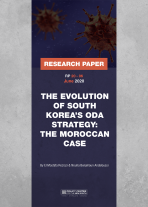The Evolution of South Korea’s ODA Strategy: The Moroccan Case
South Korea’s history of rapid industrialization and its long-standing alliance with the United States have shaped national state logic to a large extent around a desire to strictly comply with the common norms for aid in the international community, and to affirm itself as a large conventional donor, often at odds with attempts to introduce a more innovative image of South Korea by designing unique Official Development Assistance (ODA) models to be implemented in developing countries. In this study, we first track the development of South Korean aid performance through its transformation from a recipient country to a donor country. We then examine the South Korean national discourse and narrative about public aid, as well as the involvement of ordinary citizens in diplomacy through volunteering practices. To this end, the case explored throughout the study consists of South Korean volunteer practices in Morocco in the context of ODA. We argue that, as it has advanced, this development aid mechanism has become a diplomatic tool for shaping South Korea-Morocco relations. We conclude with observations on the immediate and future impact of the COVID-19 pandemic on South Korea’s implementation of its strategic ODA plan, with a focus on actions related to the African continent and Morocco.










